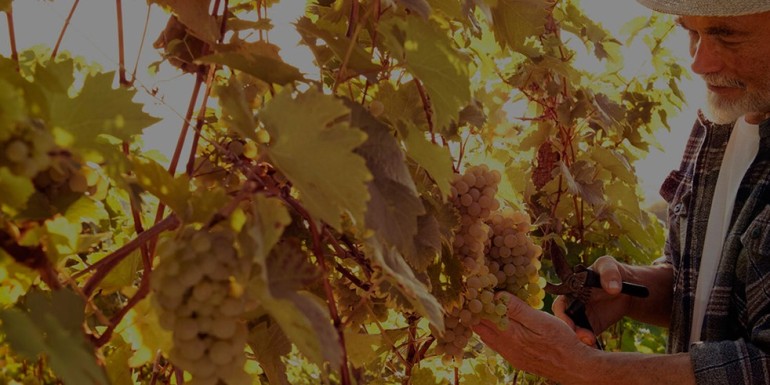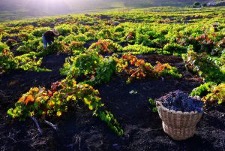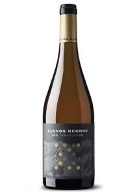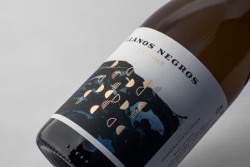
Wine tradition among volcanic lands, what makes Canarian wine so special?
Wine culture in the Canary Islands is by no means new. The cultivation of grapes for wine dates back centuries. In fact, to this day you can still find some hundred-year-old vines in some of the vineyards. However, what makes Canarian wine different? Traditionally, the cultivation of grapes for wine was not essential, therefore, it was carried out in less fruitful areas than other crops, such as cereal. That, added to the fact that farmland in the Canary Islands is not what you could say abundant, results in vineyards on steep mountain slopes, growing with volcanic soil.
 The Llanos Negros winery has its vineyards located in the Fuencaliente area. These vineyards are steeped in history, as most of the land has been passed down from father to son. In addition, to respect the natural landscape as much as possible, manual cultivation is carried out. All this counting on the fact that, although it only occupies 11 hectares, it has a 10% unevenness of the land.
The Llanos Negros winery has its vineyards located in the Fuencaliente area. These vineyards are steeped in history, as most of the land has been passed down from father to son. In addition, to respect the natural landscape as much as possible, manual cultivation is carried out. All this counting on the fact that, although it only occupies 11 hectares, it has a 10% unevenness of the land.
This land, in turn, is divided into zones, each with its own name and which sometimes give names to the different varieties of wine produced in this winery. In each area you will be able to find different types of grape variety, with vines that date back decades, some of which are over 100 years old.
And, of course, they only work with autochthonous grape varieties. Whether it is a white or black grape, thanks to the variety found in the Llanos Negros vineyards, various results are achieved in the wine. From unusual blends to long-lasting treatments, each bottle of Canarian wine that comes out of the Llanos Negros bears the unmistakable sign of the islands.
The essentials of Canarian wine
In our wine shop you can find different types of Canarian wine brought from the vineyards of Llanos Negros. However, today we want to recommend some of our favorites.
Los Tabaqueros, 2006
 The particularity of this bottle is that it is an orange wine. Orange wine has become fashionable in recent years, however, it goes back a long way. It is an ancient technique in which the grapes are left to macerate with their skins and or even the stem during part or all of the time that fermentation lasts. In addition, filtering is not carried out like that of other wines. The result is a wine that ranges from golden to amber in tone, not fully translucent, and with a much richer flavor.
The particularity of this bottle is that it is an orange wine. Orange wine has become fashionable in recent years, however, it goes back a long way. It is an ancient technique in which the grapes are left to macerate with their skins and or even the stem during part or all of the time that fermentation lasts. In addition, filtering is not carried out like that of other wines. The result is a wine that ranges from golden to amber in tone, not fully translucent, and with a much richer flavor.
To obtain the wine “Los Tabaqueros” up to four different grape varieties have been used; Vijariego, Sabro, Listán Blanco and Malvasía Aromatica. It comes from the 2006 vintage and macerated for 9 months on its lees in stainless steel tanks. Then, it has been in storage until 2015, when it was bottled.
The result is a total of 1,800 bottles of Canarian wine with a complex, aromatic and dry flavor that cannot be found elsewhere.
Mission’s Grapes, 2017
A red wine with history and height. This red wine is made from the Listán Prieto variety. It is a historical variety in the Canary Islands. In addition, since the Franciscan friars took it with them during the colonization of the Americas, you can also find it in some countries of the American continent.
The vineyards from which this particular wine comes are over 80 years old. And the plantation is located almost 1500 meters above sea level. Of course, in volcanic soil, although in this area it is mixed with clay.
This Canarian wine has a light and fragrant taste, even as a red wine.

La Time, 2000
Another of the varieties with a history from the Canary Islands, this time the Listán Blanco. Like Los Tabaqueros, it takes its name from the plantation area where this grape grows within the Llanos Negros vineyards. In this case, the vines are over sixty years old.
La Time wine can be considered a white wine or an orange wine, since it begins its maceration with its skins, but this only lasts a week. It has not been filtered either. The special detail is that it was fermented in the original cement tanks of the winery, which are over 70 years old. With a long storage period, it was not bottled until 15 years after fermentation.
Only 2,340 bottles have been bottled, making it a unique and limited wine.
Singularis, 2016
As its name indicates, Singularis is a Canarian wine with special characteristics. In fact, it is born from an experiment, so it will not be repeated again and there are very few bottles.
What makes you so unique? Its late harvest. This white wine is a mixture of grape varieties, of course local, but of minority cultivation. The vineyards in question are among the oldest in the winery, being more than 100 years old. In addition, they waited until the last moment for their harvest, obtaining grapes highly loaded with sugars. The result after fermentation was a wine with an alcohol content of 17º. Even so, its dry flavor and a certain slightly sweet aftertaste do not make us appreciate that amount of alcohol.
There are only 450 bottles of this surprising white wine that leaves no one indifferent.
Discover now the flavors of Canarian wine brought to you by Llanos Negros.
There is a wine-growing tradition throughout the Iberian Peninsula and, in general, throughout the Mediterranean, thanks to the wonderful climate we enjoy. But not everywhere you can grow on volcanic soil, getting resistant strains and peculiar flavors like the one found in the Canary Islands and gives its flavor to these incredible wines.
Thanks to the history of the Llanos Negros winery, tasting its wines you will be able to glimpse all the beauty of that tradition on your palate. Enjoy rich and complex wines in flavor and aroma that will accompany you in your evenings and meals and that will give a unique touch to special occasions.
